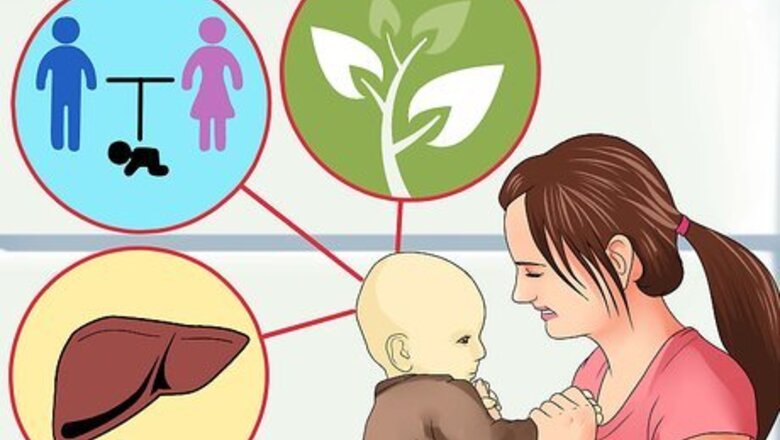
views
X
Research source
Elevated levels of bilirubin in the blood (hyperbilirubinemia) leads to jaundice (yellowing of the skin and the whites of the eyes) and indicates liver problems.[2]
X
Trustworthy Source
Mayo Clinic
Educational website from one of the world's leading hospitals
Go to source
Many babies experience jaundice during the first week of life.[3]
X
Research source
Adults can also experience elevated levels of bilirubin as a result of liver conditions.[4]
X
Trustworthy Source
Centers for Disease Control and Prevention
Main public health institute for the US, run by the Dept. of Health and Human Services
Go to source
Treatments differ between babies and adults with bilirubin. By learning more about the effects and causes of bilirubin in both adults and babies you will be able to best identify and treat the condition.
Lowering Bilirubin Levels in Infants

Evaluate your infant's risk factors for hyperbilirubinemia. The factors that lead to high levels of bilirubin can be hereditary, environmental, or related to other health conditions. Babies born prematurely are less likely to be able to process bilirubin because their livers are not sufficiently developed. Babies whose blood type is incompatible with the mother's type -- known as ABO Incompatibility -- may be born with higher levels of bilirubin in their blood. If the baby is significantly bruised during birth, the breakdown of red blood cells may increase bilirubin levels. Babies can develop "breast milk jaundice" for two reasons: the presence of certain proteins in the mother's milk, or the baby not receiving enough milk, which leads to dehydration. Some babies can have liver, blood or enzyme problems or other medical problems that can lead to elevated bilirubin. Also, babies can have an infection which can cause elevated bilirubin.

Feed your baby frequently. Your doctor may recommend feeding an infant with jaundice up to 12 times a day. Since latching and sucking problems can cause the infant to receive less breast milk, consider enlisting the aid of a lactation consultant who is trained to help mothers feed their babies. Feeding the baby more often will encourage bowel movements, which eliminate bilirubin. If increased breastfeeding does not reduce bilirubin levels, your pediatrician may direct you to supplement the baby's diet with formula or expressed breast milk.

Ask your pediatrician about phototherapy. Phototherapy involves exposing the infant to light in the blue-green spectrum. The light waves pass through the baby's body and into the blood, where it converts the bilirubin into materials that the baby's body will be able to excrete. The baby will wear soft eye patches to protect their eyes from the light. They are also able to wear a diaper during the therapy. The baby will likely have loose, frequent, and possibly greenish bowel movements as a side effect of phototherapy. This is normal and should end when the treatments have stopped. While direct, natural sunlight can help lower bilirubin levels, it is not recommended as treatment. It is too difficult to measure and control both the level of sunlight exposure and the baby's body temperature during exposure.
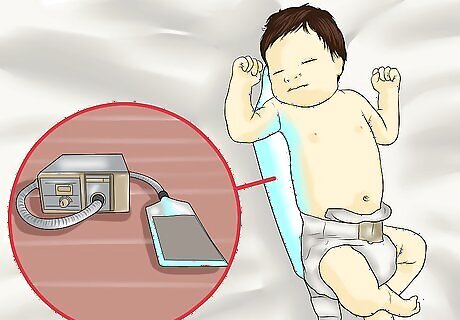
Consider using a biliblanket. The biliblanket is a advanced, fiber-optic based phototherapy treatment. The biliblanket consists of woven fiber-optic material that is placed directly against the baby fully expose the infant to light. It allows the baby to be held and nursed without interrupting the treatment. The biliblanket may cause the baby's skin to look bleached or reddened, but this is actually part of the treatment process that will resolve when bilirubin levels are lowered.

Discuss other treatments with your doctor. If the jaundice is caused by an infection or other medical problem, such as increased breakdown of red blood cells, your doctor may recommend other treatments such as medications or even a blood transfusion.
Lowering Bilirubin Levels in Adults
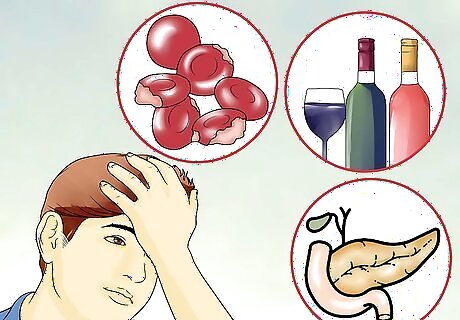
Assess your health to identify conditions that can elevate bilirubin levels in adults. The bilirubin production system can run into trouble at one of three points: before, during, and after bilirubin production. Each of these problems can result from a set of related conditions: Adults can develop what is called "unconjugated jaundice" when the problem occurs before bilirubin is produced. This is most often caused by reabsorption of a large blood clot or by hemolytic anemia. During the production of bilirubin, adults can develop jaundice as a result of viruses such as hepatitis and Epstein-Barr, autoimmune disorders, and overconsumption of alcohol or certain medications including acetaminophen, oral contraceptives, and steroids. If the adult develops jaundice because of problems after bilirubin production, the problem may lie in the gallbladder or pancreas. Gain clarity on elevated bilirubin result. "When my liver function test showed slightly high bilirubin, I wasn't sure what that meant. This article clearly explained how bilirubin relates to liver health and conditions like jaundice. Now, I feel empowered to discuss the next steps with my doctor." - Khalid Z. Simplify complex health issues for caregivers. "As someone helping a friend manage multiple medical problems, I found this content so helpful for grasping conditions and treatments in simple terms. Breaking down the science makes me a more informed advocate." - Laura S. Prompt critical thinking on potential causes. "When I noticed yellowing eyes, I hadn't considered it could relate to the blood clots I had while traveling. This article prompted me to reflect more on potential causes for my symptoms. Now, I can have a focused discussion with my doctor." - Bert M. Arm patients with the knowledge to collaborate with doctors. "I manage elevated bilirubin levels along with other conditions, so I appreciated growing my health literacy through this guide. The insights help me better collaborate with my care team toward my treatment goals." - Scot D. Have a story our readers should hear? Share it with 1 billion+ annual wikiHow users. Tell us your story here.
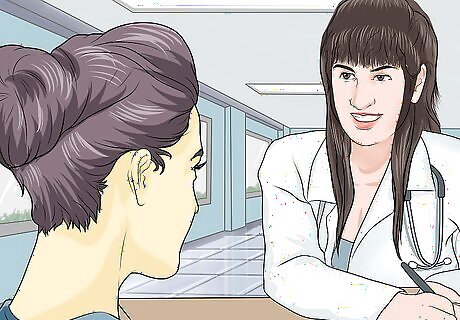
See a doctor. If you have jaundice, you will want to have your bilirubin levels checked. Jaundice can be an indication of a serious health issue. Usually, your doctor will work to find and treat the cause of your jaundice and treat any complications of the jaundice. The jaundice itself is not usually treated. Sometimes a medication may be given to help with itching, which is a common symptom of jaundice. Jaundice is often accompanied by other symptoms, which may help your doctor determine the cause: Short term jaundice, which is caused by infection, may be accompanied by chills, fever, abdominal discomfort, or other flu-like symptoms. Jaundice caused by cholestasis -- the interruption of the flow of bile -- may be accompanied by itching, weight loss, darkened urine, or lightened stools.
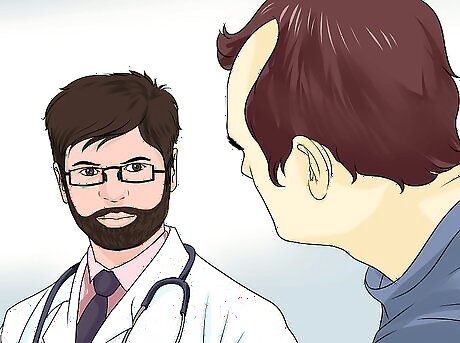
Verify that the person affected with high levels of bilirubin does not have a rare medical condition. A number of uncommon medical disorders can lead to elevated bilirubin and jaundice. Gilbert syndrome is a genetic liver disorder. Patients have a reduced amount of the liver enzyme needed to break down bilirubin. Although present from birth, symptoms, which include jaundice, fatigue, weakness, and gastrointestinal discomfort, may not appear until young adulthood. Crigler-Najjar disease is an extremely rare condition that is also caused by an enzyme deficiency. There are two types of this disease; the more common one, called Arias' syndrome, can be treated so that patients can live a normal or near-normal lifespan. People with sickle cell anemia or other blood disorders also have a higher risk of jaundice.
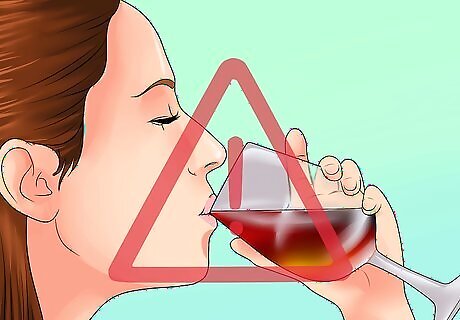
Limit your alcohol consumption. Alcohol can damage the liver, which leads to increased bilirubin levels, so limit your consumption to the recommended daily allowance (1-2 drinks per day depending on your age). Some people may be advised to completely eliminate alcohol consumption. Alcohol can damage the liver in three ways: By leaving excess fat in liver cells. This condition is known as fatty liver disease. Many people who have this condition do not experience symptoms, but those who do may experience discomfort and fatigue. By causing scarring and inflammation of the liver. These symptoms may indicate alcoholic hepatitis. Additional symptoms may include vomiting, abdominal pain, and fever. Alcoholic hepatitis can sometimes be reversed by abstaining from alcohol. This can also be caused by viral hepatitis or autoimmune hepatitis. By disrupting the functioning of the liver. Cirrhosis of the liver is characterized by severe scarring of the liver and disruption of its ability to process food and to remove harmful substances from the blood.

Maintain a healthy weight and diet. Studies have shown that obesity can be more damaging to the liver than alcohol consumption. Obesity can lead to fatty liver, even in children. Foods that are high in fiber are particularly good for the liver, including fruits and vegetables and whole grains. Certain foods are more likely to damage the liver, including those high in fat, sugar, or salt. Other foods that may damage the liver include fried food and raw or undercooked shellfish.

Protect yourself from hepatitis. Hepatitis A, B, and C are all viruses that negatively affect the liver. Avoid contracting the disease by taking precautions: Hepatitis B vaccination is recommended for everyone starting shortly after birth. Hepatitis A vaccination is recommended for certain high-risk people or those traveling to high-risk areas. If you are traveling to areas of the world with high rates of hepatitis, get vaccinated before leaving. Hepatitis can also be contracted through risky behaviors such as intravenous drug use and unprotected sex.

Exercise caution when taking medication. Be aware that some medications, including over-the-counter pain medication and common prescription drugs such as cholesterol-lowering drugs, antibiotics, and anabolic steroids, can cause toxic hepatitis. Talk to your doctor if you are unsure if you are taking medications that may be harming your liver. Some alternative medicines thought to improve liver health and function have actually been linked to liver damage. Consult your doctor before taking alternative medicines. Some of the commonly used herbs that can damage your liver include green tea, kava, comfrey, mistletoe, Chaparral, and skullcap. The liver is responsible for breaking down medications, and it is possible for them to cause damage during this process. Acetaminophen is the most commonly used over the counter medication that can damage the liver.




















Comments
0 comment